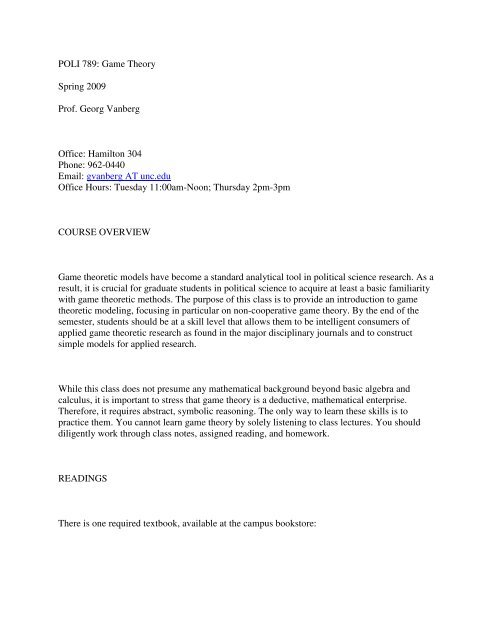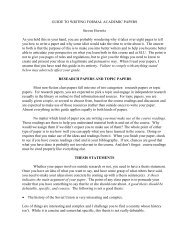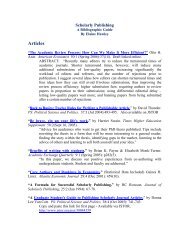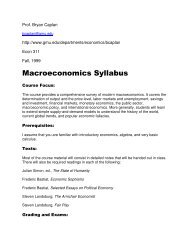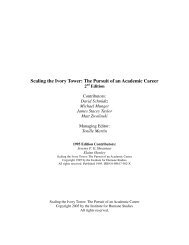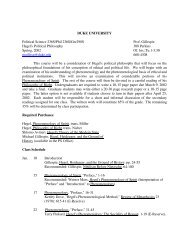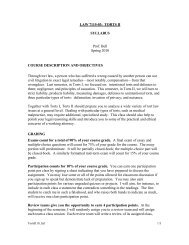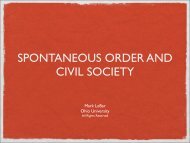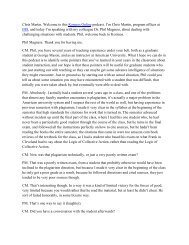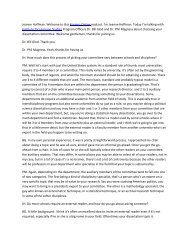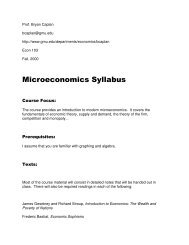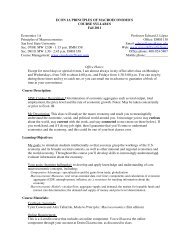POLI 789: Game Theory Spring 2009 Prof. Georg Vanberg ... - Kosmos
POLI 789: Game Theory Spring 2009 Prof. Georg Vanberg ... - Kosmos
POLI 789: Game Theory Spring 2009 Prof. Georg Vanberg ... - Kosmos
Create successful ePaper yourself
Turn your PDF publications into a flip-book with our unique Google optimized e-Paper software.
<strong>POLI</strong> <strong>789</strong>: <strong>Game</strong> <strong>Theory</strong><br />
<strong>Spring</strong> <strong>2009</strong><br />
<strong>Prof</strong>. <strong>Georg</strong> <strong>Vanberg</strong><br />
Office: Hamilton 304<br />
Phone: 962-0440<br />
Email: gvanberg AT unc.edu<br />
Office Hours: Tuesday 11:00am-Noon; Thursday 2pm-3pm<br />
COURSE OVERVIEW<br />
<strong>Game</strong> theoretic models have become a standard analytical tool in political science research. As a<br />
result, it is crucial for graduate students in political science to acquire at least a basic familiarity<br />
with game theoretic methods. The purpose of this class is to provide an introduction to game<br />
theoretic modeling, focusing in particular on non-cooperative game theory. By the end of the<br />
semester, students should be at a skill level that allows them to be intelligent consumers of<br />
applied game theoretic research as found in the major disciplinary journals and to construct<br />
simple models for applied research.<br />
While this class does not presume any mathematical background beyond basic algebra and<br />
calculus, it is important to stress that game theory is a deductive, mathematical enterprise.<br />
Therefore, it requires abstract, symbolic reasoning. The only way to learn these skills is to<br />
practice them. You cannot learn game theory by solely listening to class lectures. You should<br />
diligently work through class notes, assigned reading, and homework.<br />
READINGS<br />
There is one required textbook, available at the campus bookstore:
1. •Martin Osborne. 2004. An Introduction to <strong>Game</strong> <strong>Theory</strong>. Oxford: Oxford<br />
University Press.<br />
In general, I would encourage you to work through the assigned sections of the textbook after we<br />
have covered the material in class. In my experience, doing things in this order is most helpful in<br />
reinforcing the material. You will also be completing frequent homework assignments. As a<br />
rough guide, I expect that most students will spend 8-10 hours each week outside of class to go<br />
over material and to complete homework assignments.<br />
GRADES AND EVALUATION<br />
Grades will be based on participation and two take-home exams. Your participation grade will<br />
depend on your in-class participation and on completing homework assignments. I strongly<br />
encourage you to work with other graduate students on homework. At the same time, it is<br />
important to keep in mind that every student must master the material. Each week, we will<br />
devote some time to reviewing homework assignments in class, and I will feel free to call on<br />
anyone to present the solution to a problem. You may NOT collaborate on the take-home exams.<br />
Participation: 20%<br />
Exam 1: 40%<br />
Exam 2: 40%<br />
ACADEMIC DISHONESTY:<br />
Students and faculty at UNC are governed by the Honor Code, and academic dishonesty will not<br />
be tolerated. Any student who is caught attempting to represent someone else's work as their own<br />
or to cheat in any other manner will be subject to university discipline under the Honor Code. If<br />
you have any questions regarding this policy, you can refer to the University Code of Conduct by<br />
clicking here.<br />
STUDENTS WITH CHALLENGES
Students with challenges who require individualized testing or other accommodations should<br />
identify themselves and express their needs during the first week of the semester. Where the<br />
challenge is not immediately apparent, verification will be required.<br />
(TENTATIVE) SEMESTER SCHEDULE<br />
SECTION 1: NORMAL FORM GAMES, MIXED STRATEGIES, AND NASH<br />
EQUILIBRIUM<br />
WEEK 1 (1/13 and 1/15):<br />
1. •Osborne, Chapter 1, 2, & Math Appendix<br />
WEEK 2 (1/20 and 1/22):<br />
1. •Osborne, Chapter 2 and 3 (except sections 3.5 and 3.6)<br />
WEEK 3 (1/27 and 1/29):<br />
1. •Osborne, Chapter 3 and 4 (except sections 4.11 and 4.12)<br />
2. •Geddes, Barbara. 1991. “A <strong>Game</strong> Theoretic Model of Reform in Latin American<br />
Democracies.” American Political Science Review 85: 371-392.<br />
3. •Tsebelis, <strong>Georg</strong>e. "The Abuse of Probability In Political Analysis: The Robinson<br />
Crusoe Fallacy." American Political Science Review 83: 77-91.
SECTION 2: EXTENSIVE FORM GAMES AND SUBGAME PERFECT EQUILIBRIUM<br />
WEEK 4 (2/3 - no class on 2/5):<br />
1. •Osborne, Chapter 5<br />
WEEK 5 (2/10 and 2/12):<br />
1. •Osborne, Chapter 6 (except section 6.4)<br />
WEEK 6 (2/17 and 2/19):<br />
1. •Osborne, Chapter 7 (except section 7.5)<br />
WEEK 7 (2/24 and 2/26):<br />
1. •Osborne, Chapter 7<br />
2. •<strong>Vanberg</strong>, <strong>Georg</strong>. 1998. “Abstract Judicial Review, Legislative Bargaining, and<br />
Policy Compromise.” Journal of Theoretical Politics 10: 299-326.<br />
WEEK 8 (3/3 and 3/5):<br />
1. •Review and EXAM 1 (Handed out on 3/3 - due on 3/5)
SPRING BREAK (3/10-3/12)<br />
SECTION 3: REPEATED GAMES<br />
WEEK 9 (3/17 and 3/19):<br />
1. •Osborne, Chapter 14<br />
WEEK 10 (3/24 and 3/26):<br />
1. •Osborne, Chapter 15<br />
2. •Milgrom, Paul, Douglass North, and Barry Weingast. 1990. “The Role of<br />
Institutions in the Revival of Trade: The Law Merchant, Private Judges, and the<br />
Champagne Fairs.” Economics and Politics 2: 1-22.<br />
SECTION 4: BAYESIAN GAMES<br />
WEEK 11 (3/31 – no class on 4/2):<br />
1. •Osborne, Chapter 9 (except sections 9.6 – 9.8)<br />
WEEK 12 (4/7 and 4/9):
1. •Osborne, Chapter 9 (except sections 9.6 – 9.8)<br />
2. •Roger Myerson. 1992. "On the Value of <strong>Game</strong> <strong>Theory</strong> in Social Science,"<br />
Rationality and Society 4:62-73.<br />
WEEK 13 (4/14 and 4/16):<br />
1. •Osborne, Chapter 10 (except sections 10.6 and 10.8)<br />
WEEK 14 (4/21 and 4/23):<br />
1. •Osborne, Chapter 10 (except sections 10.6 and 10.8)<br />
2. •Gilligan, Thomas and Keith Krehbiel. 1990. “Organization of Informative<br />
Committees by a Rational Legislature.” American Journal of Political Science 34: 531-<br />
564.<br />
3. •Rubinstein, Ariel. 1991. "Comments on the Interpretation of <strong>Game</strong> <strong>Theory</strong>,"<br />
Econometrica 59:909-24.<br />
EXAM 2 (Handed out on 4/23 - due on 4/27)


